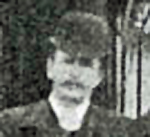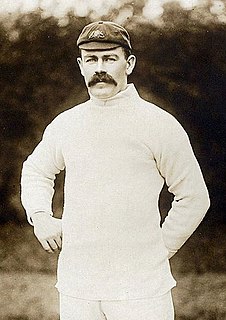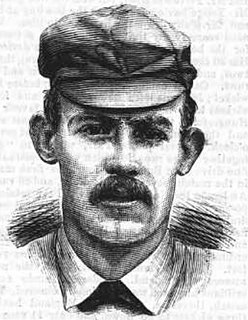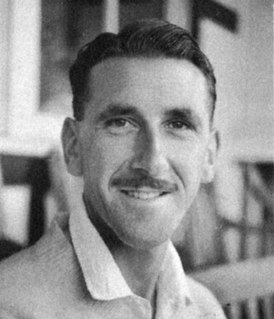Related Research Articles

James Charles Laker was an English professional cricketer who played for Surrey County Cricket Club from 1946 to 1959 and represented England in 46 Test matches. He was born in Shipley, West Riding of Yorkshire, and died in Wimbledon, London.

Danish Parabha Shanker Kaneria, is a Pakistani former cricketer who played for the Pakistan national cricket team between 2000 and 2010. A right-arm leg spinner known for his well-disguised googly. He is fourth on the list of bowlers with most Test wickets for Pakistan, behind only fast bowlers Wasim Akram, Waqar Younis and Imran Khan. Kaneria was the second Hindu after Anil Dalpat, and seventh non-Muslim to represent Pakistan in international cricket.

John William Hearne was a Middlesex leg-spinning all-rounder cricketer who played from 1909 to 1936, and represented England in 24 Test matches between 1911 and 1926.

The Australian cricket team in England in 1948 was captained by Don Bradman, who was making his fourth and final tour of England. The team is famous for being the only Test match side to play an entire tour of England without losing a match. This feat earned them the nickname of "The Invincibles", and they are regarded as one of the greatest cricket teams of all time. According to the Australian federal government the team "is one of Australia's most cherished sporting legends".

Robert William Taylor is an English former cricketer who played as wicket-keeper for Derbyshire between 1961 and 1984 and for England between 1971 and 1984. He made 57 Test, and 639 first-class cricket appearances in total, taking 1,473 catches. The 2,069 victims across his entire career is the most of any wicket-keeper in first-class history. He is considered one of the world's most accomplished wicket-keepers. He made his first-class debut for Minor Counties against South Africa in 1960, having made his Staffordshire debut in 1958. He became Derbyshire's first choice wicket-keeper when George Dawkes sustained a career-ending injury. His final First Class appearance was at the Scarborough Festival in 1988. He remained first choice until his retirement except for a short period in 1964 when Laurie Johnson was tried as a batsman-wicketkeeper.

Arnold James Fothergill was an English professional cricketer who played first-class cricket for Somerset County Cricket Club and the MCC in a career which spanned from 1870 until 1892. A left-arm fast-medium pace bowler, he appeared for England in two Test matches in 1889.

Roy Kilner was an English professional cricketer who played nine Test matches for England between 1924 and 1926. An all-rounder, he played for Yorkshire County Cricket Club between 1911 and 1927. In all first-class matches, he scored 14,707 runs at an average of 30.01 and took 1,003 wickets at an average of 18.45. Kilner scored 1,000 runs in a season ten times and took 100 wickets in a season five times. On four occasions, he completed the double: scoring 1,000 runs and taking 100 wickets in the same season, recognised as a sign of a quality all-rounder.
Michael Francis Malone is a former Australian cricketer who played in one Test match and ten One Day Internationals between 1977 and 1982. Malone played one Test prior to joining World Series Cricket. In English county cricket he had a period with Lancashire. He was also an Australian rules football full-forward and played in 104 WANFL games for Subiaco.

Mudhsuden Singh "Monty" Panesar is a former English international cricketer. A left-arm spinner, Panesar made his Test cricket debut in 2006 against India in Nagpur and One Day International debut for England in 2007. In English county cricket, he last played for Northamptonshire in 2016, and has previously played for Northamptonshire until 2009, Sussex from 2010 to 2013 and Essex from 2013 to 2015. He has also played for the Lions in South Africa.
Billy Ashley Godleman is an English first-class cricketer who plays for Derbyshire and is the team captain. He is a left-handed batsman and a right-arm leg-spin bowler. He played for Middlesex and Essex before joining Derbyshire in 2013. Godleman has previously represented the England under-19 team.

When the First World War ended in November 1918, thousands of Australian servicemen were in Europe as members of the First Australian Imperial Force (AIF) and many remained until the spring of 1919. In England, a new first-class cricket season was planned, the first since 1914, and an idea that came to fruition was the formation of an Australian touring side made up of servicemen. Agreement was reached with the Australian Corps HQ in London, commanded by Field Marshal William Birdwood, 1st Baron Birdwood, and the Australian Imperial Force Touring XI was formed, initially under the captaincy of pre-war Test player Charlie Kelleway. Kelleway departed after only six matches following a dispute about the fixtures list. A players' meeting elected future Test player Herbie Collins as team captain for the remainder of the tour, despite the fact that Collins' military rank was lance corporal and there were seven officers in the party. The bulk of the team remained intact for nearly nine months from May 1919, playing 33 matches in Great Britain, ten in South Africa on their way home and then another three in Australia itself before disbanding in February 1920. Of the 46 matches, 39 are adjudged first-class and the team had only four defeats, all of these in England. The players lived on their army pay and all profits from gate money went to an AIF Sports Control Board.
All first-class cricket was cancelled in the 1940 to 1944 English cricket seasons because of the Second World War; no first-class matches were played in England after Friday, 1 September 1939 until Saturday, 19 May 1945.

The Australian cricket team toured England during the 1902 English cricket season. The five-Test series between the two countries has been fondly remembered; in 1967 the cricket writer A. A. Thomson described the series as "a rubber more exciting than any in history except the Australia v West Indies series in 1960–61". Australia had won the previous three Test rubbers between the two countries, and now won their fourth successive series, by two matches to one with two draws. In the process they "beat the records of all their predecessors in the country" by losing only two of 39 matches during the tour, their defeats being against England in the Fifth Test and in the first of their two fixtures against Yorkshire. The remaining 37 matches gave 23 wins for Australia and 14 draws.
Michael Burns is an English first-class list cricket umpire and former first-class cricketer who played county cricket for Warwickshire and Somerset in a first-class career which spanned from 1992 until 2005. He also played Minor Counties cricket for Cumberland and Cornwall. An adaptable cricketer, he appeared for Cumberland and Warwickshire as a wicket-keeper, but when he moved to Somerset he developed into an aggressive batsman who bowled at medium-pace when needed.

William Ederick Bates was an English first-class cricketer who played for Yorkshire, Wales and most notably, Glamorgan, over a long career from 1907 to 1931. He was the son of Billy Bates, another notable Yorkshire born cricketer.
Keith Stevenson is a former English first-class cricketer who played for Derbyshire from 1974 to 1977 and for Hampshire from 1978 to 1984.

Frank Henry Vigar was an English cricketer who played first-class cricket for Essex between 1938 and 1954. A right-handed batsman, and leg break bowler, Vigar served as an all-rounder with 8,858 runs at 26.28 and 241 wickets at 37.90. From his rained-off debut in 1938, Vigar went on to play 257 matches for his county. His greatest success came in the "golden summer" of 1947, where he scored 1,735 runs and took 64 wickets. A partnership with Peter Smith of 218 for the final wicket remains an Essex record.
John William Lee, generally known as Jack Lee, was an English cricketer who played for Somerset from 1925 to 1936, having played one match for Middlesex in 1923. He was an all-rounder, scoring six centuries and taking ten wickets in a match on two occasions by the end of his career. He was killed on active service with the British Army during the Second World War.
James Wootton was an English first-class cricketer. Wootton was a left-handed batsman who bowled left-arm medium pace.